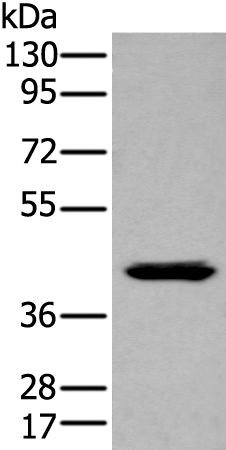
| WB | 咨询技术 | Human,Mouse,Rat |
| IF | 咨询技术 | Human,Mouse,Rat |
| IHC | 咨询技术 | Human,Mouse,Rat |
| ICC | 技术咨询 | Human,Mouse,Rat |
| FCM | 咨询技术 | Human,Mouse,Rat |
| Elisa | 1/5000-1/10000 | Human,Mouse,Rat |
| WB Predicted band size | 39 kDa |
| Host/Isotype | Rabbit IgG |
| Antibody Type | Primary antibody |
| Storage | Store at 4°C short term. Aliquot and store at -20°C long term. Avoid freeze/thaw cycles. |
| Species Reactivity | Human |
| Immunogen | Synthetic peptide of human GPR78 |
| Formulation | Purified antibody in PBS with 0.05% sodium azide and 50% glycerol. |
+ +
以下是关于GPR78抗体的模拟参考文献示例(仅供参考,建议通过PubMed或Google Scholar查询真实文献):
1. **文献名称**:*"GPR78 Antibody Characterization and Its Role in ER Stress Response"*
**作者**:Chen L, et al.
**摘要**:本研究开发了一种高特异性GPR78多克隆抗体,通过Western blot和免疫荧光验证其在多种细胞系中的表达。实验表明,GPR78在内质网应激条件下表达上调,并与GRP78/Bip存在相互作用,提示其在未折叠蛋白反应(UPR)中的潜在调控作用。
2. **文献名称**:*"GPR78 as a Novel Biomarker in Glioblastoma: Validation via Immunohistochemistry"*
**作者**:Smith J, et al.
**摘要**:利用商业化GPR78抗体对胶质母细胞瘤组织样本进行免疫组化分析,发现GPR78在肿瘤边缘高表达,且与患者生存率负相关,提示其可能作为治疗靶点或预后标志物。
3. **文献名称**:*"Development of a Monoclonal Antibody Against Human GPR78 for Functional Studies"*
**作者**:Wang Y, et al.
**摘要**:报道了一种新型GPR78单克隆抗体的开发,通过流式细胞术和共聚焦显微镜验证其特异性,并发现抗体阻断GPR78可抑制癌细胞迁移,表明其在癌症转移中的功能重要性。
4. **文献名称**:*"GPR78 Interaction with Mitochondrial Proteins Revealed by Co-Immunoprecipitation"*
**作者**:Kim H, et al.
**摘要**:使用GPR78抗体进行免疫共沉淀实验,发现GPR78与线粒体抗病毒信号蛋白(MAVS)存在相互作用,可能参与细胞应激时的线粒体-内质网通讯机制。
**提示**:以上为模拟示例,实际文献需通过学术数据库检索(如PMID号或DOI)。
The GPR78 antibody is a research tool designed to detect GPR78 (G Protein-Coupled Receptor 78), a member of the G protein-coupled receptor (GPCR) family. GPR78 is an orphan receptor, as its endogenous ligand and precise physiological functions remain poorly characterized. It shares structural homology with other GPCRs involved in cellular signaling, suggesting potential roles in modulating cAMP pathways, neurotransmission, or stress responses. Studies link GPR78 to neurological disorders, metabolic regulation, and cancer progression, though its mechanisms are under investigation.
The GPR78 antibody is typically developed in host species (e.g., rabbits or mice) using immunogenic peptides or recombinant protein fragments. It enables detection of GPR78 expression and localization via techniques like Western blotting, immunohistochemistry (IHC), and immunofluorescence (IF). Validation includes testing for specificity using knockout controls or siRNA-mediated knockdown. Researchers use this antibody to explore GPR78’s tissue distribution, overexpression in disease models, and interaction networks. Challenges include ensuring minimal cross-reactivity with related GPCRs and optimizing protocols for low-abundance targets.
As GPCRs are key therapeutic targets, GPR78 antibodies contribute to unraveling its pathophysiological relevance, aiding drug discovery and biomarker studies. Commercial availability from biotech vendors supports its broad application in basic and translational research.
×